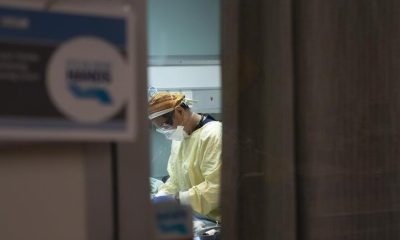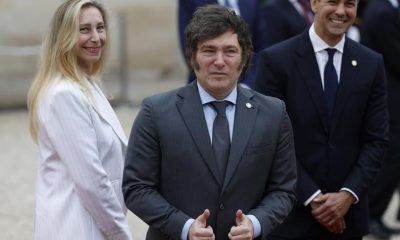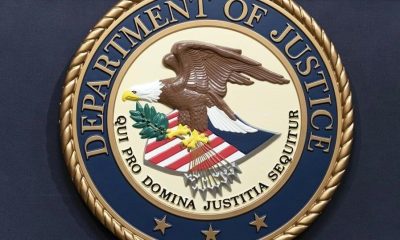Economy
China’s Economy Stumbles in the Fog of Covid War

Even if the country avoids new lockdowns of big cities, question marks over the pandemic and policy direction are dogging efforts to revive growth.
China’s economic engine has shuddered in recent months, hurt by lockdowns imposed to curb the spread of Covid. Housing sales sagged. Many shops and restaurants in some cities shuttered, some maybe for good. Youth unemployment climbed.
The slowdown has kindled doubts about the viability of China’s stringent strategy of eliminating virtually all Covid infections — whether the cure is becoming worse than the social and economic costs of restrictions. But on a recent visit to Wuhan, the city where the pandemic first took hold, China’s leader, Xi Jinping, said that extinguishing Covid remained paramount.
“It would be preferable to have a little temporary impact on economic development, rather than let the physical safety and health of the public suffer,” Mr. Xi said, state media reported. He cited the need to protect older adults as well as children from infection, and warned officials against becoming weary of the grinding two-and-a-half-year war against Covid. “Persistence,” he said, “is victory.”
That elusive victory over Covid has been made harder by the fast-moving Omicron variant — and its sub-variant, BA.5, the first domestic cases of which emerged last week in China — that is slipping through the country’s many defenses.
A month after Shanghai lifted its citywide lockdown, fresh Covid cases have emerged there in recent days, prompting officials to order many of the city’s 25 million residents to undergo testing. Anhui Province in eastern China enforced a virtual lockdown on two counties, and neighboring Jiangsu Province, a manufacturing heartland, is scrambling to contain new infections. Xi’an, a city of 13 million, has closed schools and many businesses after a flare-up.
Like swatting flies with a shovel, China’s Covid strategy can be effective, but also costly and contentious. It entails locking down apartment blocks, neighborhoods or even whole cities for days or weeks to stamp out even handfuls of cases. As a result, Mr. Xi’s insistence on Covid zero, or “dynamic zero” as Beijing calls it, has cast an unsettling shadow over the country’s economic expectations.
The Chinese government is scheduled to release the main economic data for this year’s second quarter on Friday. According to a survey by Bloomberg, economists expect that the Chinese government will report that gross domestic product grew by about 1 percent in the second quarter, compared with the same period a year earlier. That’s a big comedown from the 4.8 percent expansion in the first quarter, and is likely to put the government’s 5.5 percent growth goal for all of this year out of reach.
“Uncertainty is the main factor hurting our national economic development,” Yang Weimin, an economist who advises the Chinese government, said in a speech in late June to property developers, citing questions around Covid and pandemic prevention measures. He also pointed to investor wariness after crackdowns on companies accused of abusing their market dominance, flouting regulators or offending official moral codes.
“Uncertainty is the great enemy of action,” Mr. Yang said.
Mr. Xi wants officials to extinguish Covid outbreaks while also shoring up the economy. In Wuhan, he visited a laser equipment plant, hailing the potential of new technologies, and also visited a neighborhood that has been promoted as a model of effective Covid controls.
In practice, officials struggle with the diverging demands of Covid controls and economic recovery. The resulting strains are bearing down on China months before a Communist Party congress when Mr. Xi is almost certain to win another five-year term as the party’s leader, consolidating his status as its most powerful leader since Deng Xiaoping and Mao Zedong.
Beijing has tried to boost confidence among entrepreneurs and consumers so they spend, invest and travel. But local officials, faced with the threat of dismissal for lapses in pandemic controls, often impose additional checks and restrictions on travelers and transport, adding to the disruptions and uncertainty.
“Often, the heads of different departments and companies attend one meeting in the morning about enhancing dynamic zero, and then in the afternoon a meeting about economic growth,” said Wu Qiang, an independent political commentator in Beijing.
“The tensions are within Xi’s own model for governing the country,” he said. “The tensions really arise from him.”
For the past two years, many Chinese people have accepted the Covid restrictions as irksome but necessary. But employees and employers appear increasingly impatient over lockdowns, checks and uncertainties, especially when they have loans, rent and wages to pay.
“The local government said for sure that they would get to zero in half a month, but I reckon half a month won’t be enough,” Wang Yongguan, who makes a living grouting walls, said in a telephone interview from Sixian County in Anhui Province, which went into lockdown. He also worried about the accompanying slump in home sales. “This year won’t be any good. It wasn’t to begin with.”
Policymakers trying to bolster investor confidence also fear they will be accused of undermining Mr. Xi’s policies to clean up companies accused of malfeasance and reckless investment, said Christopher K. Johnson, the president of the China Strategies Group, citing conversations with officials in Beijing.
“Does the boss really want to relent on some of these crackdowns, or is it temporary?” Mr. Johnson said, referring to Mr. Xi. “There’s a lot of uncertainty.”
China’s stop-start Covid restrictions may continue into next year at least, in part because the government has focused on restrictions and testing over vaccinations. Older adults have a relatively low vaccination rate. The Chinese leadership has so far refused to approve more effective, foreign-developed vaccines — a decision driven by political pride rather than medical considerations, many experts say.
Yet Chinese leaders also worry that a deep slowdown could cause social discontent, an anxiety magnified by the impending party congress. Officials are under particular pressure to contain unemployment, which among urban residents age 16 to 24 rose to 18.4 percent in May, according to China’s National Bureau of Statistics. More than 10 million college graduates, a record number, are joining the job search this year. Others will take refuge in graduate school.
Even in Beijing, which has avoided a citywide shutdown by imposing only limited restrictions, business can be tough. Wang Jing said his restaurant in an alleyway usually crowded with tourists had lost more than 90 percent of its income in May, when Beijing banned dining in restaurants. The limits eased in early June, but only about a third of business has come back.
“This year is for sure the toughest we’ve had,” he said. “All my waiters have been with me for more than 10 years. They have young and old to take care of, and are waiting for me to issue wages. How could I ever fire them?”
China has been edging toward some policy compromises. Officials halved the days of quarantine imposed on international travelers and close contacts to try to reduce some of the disruption. Mr. Xi and the premier, Li Keqiang, have also obliquely hinted that annual growth might be lower than the target of 5.5 percent that the government set earlier this year. Some former officials and policy advisers have openly said that businesses need more clarity to sustain an economic recovery.
“Our hearts can’t be riding on waves, bobbing up and down. That’s bad for economic growth and social development,” Hu Deping, a former vice chairman of All-China General Chamber of Industry and Commerce, said in a speech to Chinese private business owners in June. “Entrepreneurs will gain confidence only when there are no policy contradictions.”
Even if China is able to contain Covid without putting major cities under lockdowns, the accumulated uncertainty is prompting some companies to rethink their plans.
For Citrosuco, a Brazilian juice maker, business had been going well until Shanghai locked down in April. Its containers of frozen orange juice sat at the city’s port, held up by customs inspectors checking goods for the presence of the virus, said Joshua Lim, a general manager for the company in the city.
Clearing customs and getting the juice shipments to warehouses, which usually takes three to four days, took two weeks, he said. Citrosuco bosses in Brazil began reassessing China’s prospects, he said.
“They are asking questions like, how can we better protect our business?” he said. “If we invest now, what will the payback look like and what other risks will we be blindsided by?”
Joy Dong, Zixu Wang, Li You, Claire Fu and Liu Yi contributed research and reporting.
Economy
Here is Trump economy: Slower growth, higher prices and a bigger national debt

If Donald Trump is re-elected president of the United States in November, Americans can expect higher inflation, slower economic growth and a larger national debt, according to economists.
Trump’s economic agenda for a second term in office includes raising tariffs on imports, cutting taxes and deporting millions of undocumented migrants.
“Inflation will be the main impact” of a second Trump presidency, Bernard Yaros, lead US economist at Oxford Economics, told Al Jazeera.
“That’s ultimately the biggest risk. If Trump is president, tariffs are going up for sure. The question is how high do they go and how widespread are they,” Yaros said.
Trump has proposed imposing a 10 percent across-the-board tariff on all imported goods and levies of 60 percent or higher on Chinese imports.
During Trump’s first term in office from 2017 to 2021, his administration introduced tariff increases that at their peak affected about 10 percent of imports, mostly goods from China, Moody’s Analytics said in a report released in June.
Those levies nonetheless inflicted “measurable economic damage”, particularly to the agriculture, manufacturing and transportation sectors, according to the report.
“A tariff increase covering nearly all goods imports, as Trump recently proposed, goes far beyond any previous action,” Moody’s Analytics said in its report.
Businesses typically pass higher tariffs on to their customers, raising prices for consumers. They could also affect businesses’ decisions about how and where to invest.
“There are three main tenets of Trump’s campaign, and they all point in the same inflationary direction,” Matt Colyar, assistant director at Moody’s Analytics, told Al Jazeera.
“We didn’t even think of including retaliatory tariffs in our modelling because who knows how widespread and what form the tit-for-tat model could involve,” Colyar added.
‘Recession becomes a serious threat’
When the US opened its borders after the COVID-19 pandemic, the inflow of immigrants helped to ease labour shortages in a range of industries such as construction, manufacturing, leisure and hospitality.
The recovery of the labour market in turn helped to bring down inflation from its mid-2022 peak of 9.1 percent.
Trump has not only proposed the mass deportation of 15 million to 20 million undocumented migrants but also restricting the inflow of visa-holding migrant workers too.
That, along with a wave of retiring Baby Boomers – an estimated 10,000 of whom are exiting the workforce every day – would put pressure on wages as it did during the pandemic, a trend that only recently started to ease.
“We can assume he will throw enough sand into the gears of the immigration process so you have meaningfully less immigration, which is inflationary,” Yaros said.
Since labour costs and inflation are two important measures that the US Federal Reserve weighs when setting its benchmark interest rate, the central bank could announce further rate hikes, or at least wait longer to cut rates.
That would make recession a “serious threat once again”, according to Moody’s.
Adding to those inflationary concerns are Trump’s proposals to extend his 2017 tax cuts and further lower the corporate tax rate from 21 percent to 20 percent.
While Trump’s proposed tariff hikes would offset some lost revenue, they would not make up the shortfall entirely.
According to Moody’s, the US government would generate $1.7 trillion in revenue from Trump’s tariffs while his tax cuts would cost $3.4 trillion.
Yaros said government spending is also likely to rise as Republicans seek bigger defence budgets and Democrats push for greater social expenditures, further stoking inflation.
If President Joe Biden is re-elected, economists expect no philosophical change in his approach to import taxes. They think he will continue to use targeted tariff increases, much like the recently announced 100 percent tariffs on Chinese electric vehicles and solar panels, to help US companies compete with government-supported Chinese firms.
With Trump’s tax cuts set to expire in 2025, a second Biden term would see some of those cuts extended, but not all, Colyar said. Primarily, the tax cuts to higher earners like those making more than $400,000 a year would expire.
Although Biden has said he would hike corporate taxes from 21 percent to 28 percent, given the divided Congress, it is unlikely he would be able to push that through.
The contrasting economic visions of the two presidential candidates have created unwelcome uncertainty for businesses, Colyar said.
“Firms and investors are having a hard time staying on top of [their plans] given the two different ways the US elections could go,” Colyar said.
“In my entire tenure, geopolitical risk has never been such an important consideration as it is today,” he added.

Economy
China Stainless Steel Mogul Fights to Avoid a Second Collapse

Chinese metal tycoon Dai Guofang’s first steel empire was brought down by a government campaign to rein in market exuberance, tax evasion accusations and a spell behind bars. Two decades on, he’s once again fighting for survival.
A one-time scrap-metal collector, he built and rebuilt a fortune as China boomed. Now with the economy cooling, Dai faces a debt crisis that threatens the future of one of the world’s top stainless steel producers, Jiangsu Delong Nickel Industry Co., along with plants held by his wife and son. Its demise would send ripples through the country’s vast manufacturing sector and the embattled global nickel market.

Economy
Why Trump’s re-election could hit Europe’s economy by at least €150 billion
A Trump victory could trigger a 1% GDP hit to the eurozone economy, with Germany, Italy, and Finland most affected. Renewed NATO demands and potential cessation of US aid to Ukraine could further strain Europe.
The potential re-election of Donald Trump as US President poses a significant threat to the eurozone economy, with economists warning of a possible €150 billion hit, equivalent to about 1% of the region’s gross domestic product. This impact stems from anticipated negative trade repercussions and increased defence expenditures.
The recent attack in Butler, Pennsylvania, where former President Trump sustained an ear injury, has boosted his re-election odds. Prediction markets now place Trump’s chances of winning at 71%, a significant rise from earlier figures, while his opponent, Joe Biden, has experienced a sharp decline, with his chances dropping to 18% from a peak of 45% just two months ago.
Rising trade uncertainty and economic impact from tariffs
Economists James Moberly and Sven Jari Stehn from Goldman Sachs have raised alarms over the looming uncertainty in global trade policies, drawing parallels to the volatility experienced in 2018 and 2019. They argue that Trump’s aggressive trade stance could reignite these uncertainties.
“Trump has pledged to impose an across-the-board 10% tariff on all US imports including from Europe,” Goldman Sachs outlined in a recent note.
The economists predict that the surge in trade policy uncertainty, which previously reduced Euro area industrial production by 2% in 2018-19, could now result in a 1% decline in Euro area gross domestic product.
Germany to bear the brunt, followed by Italy
Germany, Europe’s industrial powerhouse, is expected to bear the brunt of this impact.
“We estimate that the negative effects of trade policy uncertainty are larger in Germany than elsewhere in the Euro area, reflecting its greater openness and reliance on industrial activity,” Goldman Sachs explained.
The report highlighted that Germany’s industrial sector is more vulnerable to trade disruptions compared to other major Eurozone economies such as France.
After Germany, Italy and Finland are projected to be the second and third most affected countries respectively, due to the relatively higher weight of manufacturing activity in their economies.
According to a Eurostat study published in February 2024, Germany (€157.7 billion), Italy (€67.3 billion), and Ireland (€51.6 billion) were the three largest European Union exporters to the United States in 2023.
Germany also maintained the largest trade surplus (€85.8 billion), followed by Italy (€42.1 billion).
Defence, security pressures and financial condition shifts
A Trump victory would also be likely to bring renewed defence and security pressures to Europe. Trump has consistently pushed for NATO members to meet their 2% GDP defence spending commitments. Currently, EU members spend about 1.75% of GDP on defence, necessitating an increase of 0.25% to meet the target.
Moreover, Trump has indicated that he might cease US military aid to Ukraine, compelling European nations to step in. The US currently allocates approximately €40bn annually (or 0.25% of EU GDP) for Ukrainian support. Consequently, meeting NATO’s 2% GDP defence spending requirement and offsetting the potential reduction in US military aid could cost the EU an additional 0.5% of GDP per year.
Additional economic shocks from Trump’s potential re-election include heightened US foreign demand due to tax cuts and the risk of tighter financial conditions driven by a stronger dollar.
However, Goldman Sachs believes that the benefits from a looser US fiscal policy would be marginal for the European economy, with by a mere 0.1% boost in economic activity.
“A Trump victory in the November election would likely come with significant financial market shifts,” Goldman Sachs wrote.
Reflecting on the aftermath of the 2016 election, long-term yields surged, equity prices soared, and the dollar appreciated significantly. Despite these movements, the Euro area Financial Conditions Index (FCI) only experienced a slight tightening, as a weaker euro counterbalanced higher interest rates and wider sovereign spreads.
In conclusion, Trump’s potential re-election could have far-reaching economic implications for Europe, exacerbating trade uncertainties and imposing new financial and defence burdens on the continent.

-

 News9 hours ago
News9 hours agoAfter grind of MLS regular season, Toronto FC looks forward to Leagues Cup challenge
-

 News23 hours ago
News23 hours agoCanadaNewsMedia news July 26, 2024: B.C. crews wary of winds boosting wildfires
-

 News15 hours ago
News15 hours agoOntario expanding access to RSV vaccines for young children, pregnant women
-

 News10 hours ago
News10 hours agoIn President Milei’s sit-down with Macron, Argentina says the leaders get past soccer chant fallout
-

 News8 hours ago
News8 hours agoUmicore suspends construction of $2.76B battery materials plant in Ontario
-

 News23 hours ago
News23 hours agoPeople should stay inside, filter indoor air amid wildfire smoke, respirologist says
-

 News17 hours ago
News17 hours agoFederal grand jury charges short seller Andrew Left in $16M stock manipulation scheme
-

 News19 hours ago
News19 hours agoSuspected train sabotage, bad weather dampen spirits ahead of Paris opening ceremony





















